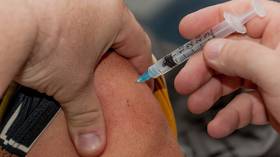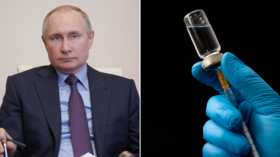Study finds link between flu shots and protection from Covid-19 infection, but scientists don’t understand why

A new study by researchers in Michigan found a strange and somewhat inexplicable link between flu vaccination and the reduced risk and severity of Covid-19 infection.
The scientists pored over medical records from more than 27,000 patients tested for Covid-19 up to and including July 2020.
Of the 27,201 participants in the study, those who had received their influenza vaccine in the previous year were less likely to test positive for the coronavirus than their flu-jab-free counterparts, with 1,218, or 4.5%, testing positive, in line with national averages.
After controlling for demographic variables such as ethnicity, race, gender, age, and underlying medical conditions, only 4% of flu vaccine recipients tested positive for Covid-19, but that number rose to 4.9% positive cases in the unvaccinated cohort.
Also on rt.com Covid-19 ‘definitively’ greater threat to life than seasonal flu, with 3.5 times higher risk of death, says new Canadian studyWhile the difference between the two groups may appear to be rather modest, it accounts for a 24% reduction in the odds of testing positive for coronavirus, which is not to be sniffed at.
The reason for this statistically significant discrepancy is still something of a mystery, and may not be because of any medical reason, but instead, the result of more responsible lifestyle choices on the part of the individuals concerned, though this has yet to be definitively proven.
“It is possible that patients who receive their flu vaccine are also people who are practicing more social distancing and following CDC guidelines,” says cardiologist Marion Hofmann Bowman of the University of Michigan.
“However, it is also plausible that there could be a direct biological effect of the flu vaccine on the immune system relevant for the fight against the SARS-CoV-2 virus.”
One possible explanation may be something called ‘trained immunity,’ via which patients who have previously been exposed to unrelated pathogens have a more ‘primed’ immune system that is ready and able to fight off a new pathogen, with varying degrees of success. The cross-reactivity of vaccines is an area of great interest, but will require years of research before any definitive causal links can be proven.
Similar results have been borne out in previous studies from around the world, but within the Michigan cohort at least, Covid-19 patients who had received their flu vaccine in the previous year were less likely to require hospitalization and ventilation.
Think your friends would be interested? Share this story!














